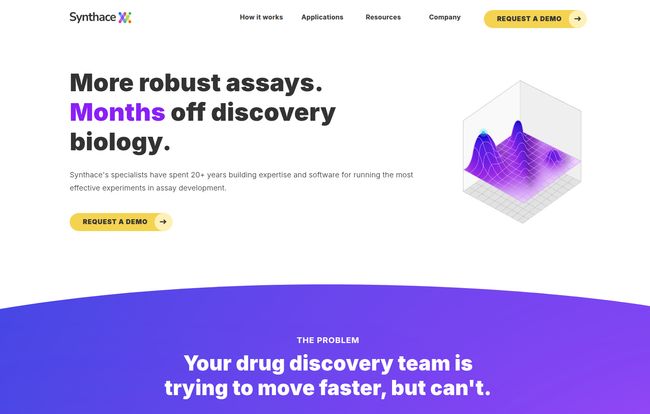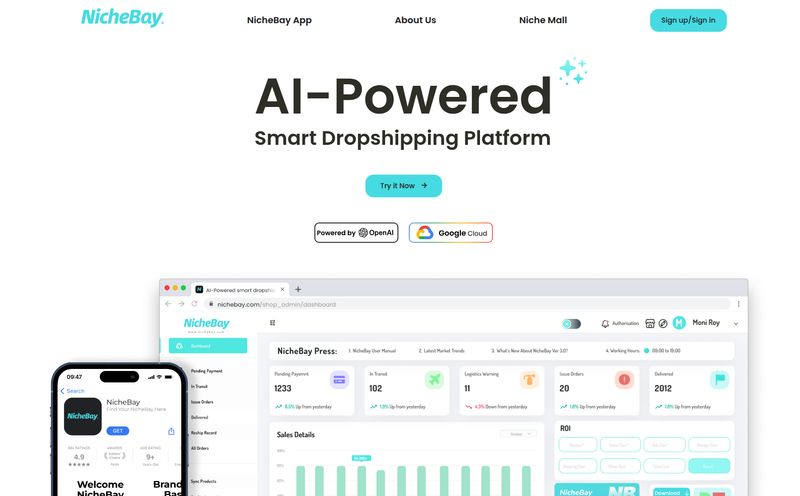I’ve been in the digital marketing and tech space for years, and I’ve seen countless platforms promise to “revolutionize” workflows. It’s a word that gets thrown around so much it’s almost lost its meaning. But every now and then, I stumble upon a company that isn’t just slapping a new coat of paint on an old process. They’re rebuilding the whole engine.
That’s the feeling I get with Synthace. If you're in discovery biology or running a drug discovery team, you know the pressure. The endless experiments, the tedious pipetting, the race against time, money, and your competition. It's a grind. We all know it. You’re working harder and harder, but the needle feels like it’s barely moving. It’s the classic lab nightmare: you’re running in place while the finish line seems to get further away.
So, what if you could automate the complex stuff, get more meaningful data from every single experiment, and actually cut months off your discovery timeline? Sounds a bit like a fantasy, right? Well, let’s talk about Synthace.
What's the Big Deal with Synthace Anyway?
At its core, Synthace is a software and expertise provider. Think of them as part tech platform, part SWAT team for your lab. They don't just hand you a piece of software and wish you luck. They partner with you to streamline your entire experimental process. Their goal is to help scientists move from painstaking, one-factor-at-a-time experiments to a more holistic, multifactorial approach.
And here’s a neat little twist for 2024: they’re weaving in generative AI like ChatGPT to help scientists design and execute protocols. It's a fascinating blend of hands-on biological expertise and cutting-edge AI, aimed at one thing: getting you to your 'eureka!' moment faster.
The Soul-Crushing Problem Synthace Tries to Solve
The Synthace homepage hits on a problem so real it almost hurts to read. It paints a picture of drug discovery teams that are siloed, short-staffed, and stuck with processes that just weren't built to scale. Does this sound familiar? Your protein sciences team does their thing, the assay development team does theirs, and the data rarely cross-pollinates in a meaningful way until it’s way too late.
It’s like trying to assemble a car where one team builds the wheels without ever talking to the team building the chassis. It's inefficient, frustrating, and a massive waste of brilliant minds. You end up with burnout and a feeling of being perpetually stuck. The real problem isn't a lack of effort; it's a lack of a system that can handle modern biological complexity.
How Synthace Changes the Game for Lab Workflows
Okay, so they’ve identified the problem. But what's the actual fix? It’s not just a single feature, but a combination of methodology, software, and support.
More Than Just Software: A Structured Approach
This is the part that really got my attention. Synthace is big on Design of Experiments (DoE). If you’re not familiar, DoE is a powerful statistical method that lets you test multiple factors and their interactions all at once. The traditional way is to change one variable at a time (One-Factor-at-a-Time, or OFAT), which is slow and often misses the crucial interplay between different factors.

Visit Synthace
Think of it like baking a cake. The OFAT method would be baking hundreds of cakes, changing only the amount of sugar in one, then only the oven temperature in another, then only the number of eggs in a third. It would take forever. DoE is like having a systematic plan to bake just a few dozen cakes, varying all those ingredients intelligently, to find the perfect recipe in a fraction of the time. Synthace provides the framework and tools to apply this powerful methodology directly to your complex biological assays.
The Power of Automation and Integration
Here’s where the software comes in. The Synthace platform allows scientists to design these complex, multifactorial experiments on their computer. It then translates those designs into automated protocols for your lab's liquid handlers and dispensers. This isn't about replacing scientists; it's about freeing them from the tyranny of the pipette. It lets them focus on the big picture—the 'why'—while the machines handle the tedious 'how'.
A big plus is that they focus on integrating with the lab equipment you already have. This lowers the barrier to entry and avoids the need for a massive, capital-intensive overhaul of your entire lab.
You're Not Alone: The Human Support Element
This might be their secret sauce. Buying enterprise software can sometimes feel like you’ve been thrown into the deep end of a pool without a life vest. Synthace seems to do the opposite. They provide dedicated specialists—actual scientists—who help with implementation, training, and ongoing support. They help you identify the bottlenecks in your process and get you seeing results from the very first experiment. It's a high-touch approach that you just dont see very often.
What's the Catch? The Real-World Hurdles
Alright, it can't all be sunshine and automated pipetting. Let’s be real. Adopting a platform like Synthace requires a shift in mindset and methodology. Your team has to be willing to leave the old, comfortable OFAT methods behind and embrace DoE. That can be a cultural challenge.
There's an initial investment, not just in the platform itself but in the time for training and support. And while they integrate with existing hardware, that integration process will still require some work and planning. It's a commitment, not a magic wand. But for teams serious about breaking through their productivity ceiling, it seems like a calculated one.
The AstraZeneca Stamp of Approval
Talk is cheap, but results speak volumes. One of the most compelling things I found was a testimonial from Helena Føllet Sjøgren, a Principal Scientist at AstraZeneca.
"Using Synthace has changed the way we do experiments, but more interestingly the way we think about experiments."
When a powerhouse like AstraZeneca says a tool has changed not just what they do but how they think, you have to pay attention. That’s not just an endorsement of a product; it’s an endorsement of a philosophy. It suggests the impact goes far beyond simple time-saving and touches the very core of the scientific process.
Let's Talk Money: Synthace Pricing
You’ve probably scrolled this far looking for a pricing table. I’ll save you the trouble: there isn’t one. Like most high-end, specialized B2B platforms, Synthace doesn't have a simple tiered pricing page. And that makes sense.
The cost will depend entirely on your lab’s specific needs, the scale of your operation, the hardware you need to integrate with, and the level of support required. It’s a bespoke solution. To get a figure, you’ll need to do what the big yellow button on their site says: Request a Demo. This is where you’ll have a consultation to discuss your unique challenges and goals.
Is Synthace Right for Your Lab?
So, who is this for? If you're a leader in a discovery biology, bioprocess, or R&D team and you're constantly frustrated by slow progress, experimental variability, and the sheer drudgery holding your brilliant scientists back, Synthace is definitely worth a look. If your team is ready to embrace a new, data-rich way of working and move beyond the limitations of traditional methods, the potential upside is huge.
It's probably not for a small academic lab on a shoestring budget or a team that is resistant to changing its core processes. This is for organizations ready to make a strategic investment in becoming faster, smarter, and more efficient.
A New Way of Thinking, Not Just a New Tool
After digging into it, Synthace feels less like just another lab tool and more like a complete operating system upgrade for research teams. It combines a powerful methodology (DoE), smart automation software, and crucial human expertise to tackle the bottlenecks that have plagued discovery biology for decades. It’s an ambitious solution for an ambitious field. By changing the way experiments are done, it has the potential to fundamentally change the speed at which we get life-changing answers.
Frequently Asked Questions (FAQ)
- What exactly is Synthace?
- Synthace is a company that provides a software platform and expert support for biology research teams. They help labs automate complex experiments, primarily by using a method called Design of Experiments (DoE) to get more data and accelerate the research and development process.
- How does Synthace use ChatGPT?
- They integrate generative AI like ChatGPT into their platform to assist scientists in designing experimental protocols. This can help translate complex scientific goals into actionable, automated steps, further speeding up the experimental design phase.
- What is Design of Experiments (DoE)?
- DoE is a statistical method for planning experiments where you change multiple factors at once in a structured way. This is much more efficient than the traditional method of changing only one variable at a time and allows you to understand how different factors interact with each other.
- Is Synthace just software?
- No. A key part of their offering is expert support. They provide dedicated specialists (who are scientists themselves) to help with implementation, training, and optimizing your lab's specific workflows. It's a combination of software and service.
- How much does Synthace cost?
- Synthace does not list public pricing. The cost is customized based on the specific needs of your lab, including scale, integrations, and support level. You need to contact them for a demo and a custom quote.
- What kind of labs benefit most from Synthace?
- Drug discovery teams, R&D labs working on assay development, bioprocess development, and molecular biology teams that are looking to increase their experimental throughput and get more robust data would benefit the most.



